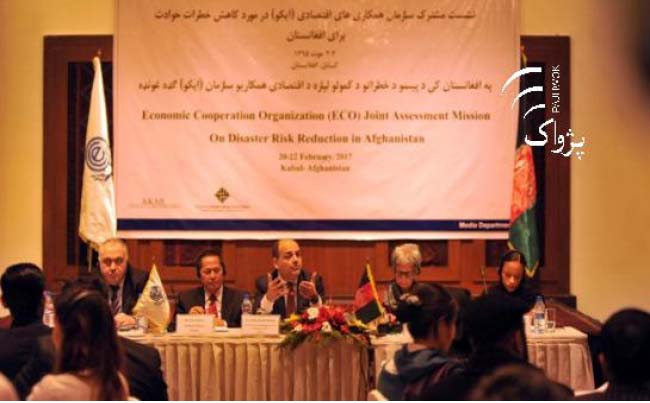KABUL - Wais Barmak, Minister for Disaster Management, addressing a joint conference with Economic Corporation Organization (ECO) titled National Consultative Workshop here in Kabul said that the purpose of the session was to take practical measures for establishing a national risks management plan for dealing with the natural disasters.
The ways which are effective in controlling the natural disasters and utilizing experiences of the regional countries in this regard are the main subjects of the workshop, he said.
Barmak said the bill had been completed and would be shared with the Presidential Palace for approval in the next few days.
Based on the Natural Disaster Risks Reduction plan, the employment structure would be reformed, human capacity improved, alert system installed in vulnerable areas and coordination would be tightened for better management of disasters.
Barmak went on to say that the organizational structure of his ministry was not at the level to cope with the natural disasters but he assured natural disaster risks would be reduced with the newly prepared plan.
He said the plan was prepared following suggestions from Afghan experts and experiences of the regional countries. With the implementation of the bill, Afghanistan would be in a better situation for the next four years in risks management.
Barmak said, Afghanistan risks research system was also made ready and would be executable from April 2017 or the beginning of the coming solar year.
Afghanistan is 99 percent at risk of natural disasters and 60 percent of the country’s geography is prone to earthquakes, he said, adding studies showed bad economic situation, insecurity and pressures of foreign countries on Afghan migrants to leave would face Afghanistan with poor humanitarian situation in the next solar year.
Esther Kuisch Laroche Director and Representative of UNESCO Cluster Office in Tehran during the meeting said that natural disasters seriously affect the local people’s economy. To reduce the risks, the UNESCO implemented natural disasters’ risks reduction programs in many countries that yielded good results.
She said UNESCO and other international organizations had carried out many workshops for natural disasters’ risks reduction in Afghanistan by local human resources.
Calling the implementation of ‘Sendai Framework’ in Afghanistan valuable, she said the risks of natural disasters would be considerably declined if the agreement implemented.
The Sendai Framework for Disaster Risk Reduction 2015-2030 (Sendai Framework) is the first major agreement of the post-2015 development agenda, with seven targets and four priorities for action.
It was endorsed in Sendai city, Japan, by the UN General Assembly following the 2015 Third UN World Conference on Disaster Risk Reduction (WCDRR).
The four priorities of the agreement are: understanding disaster risk, strengthening disaster risk governance to manage disaster risk, investing in disaster risk reduction for resilience, and enhancing disaster preparedness for effective response and to “Build Back Better” in recovery, rehabilitation and reconstruction.
The workshop was also attended by representatives from Aga Khan Development Network, ECO and UNESCO. (Pajhwok)
Home » Afghanistan » Disaster Risk Reduction Document Prepared
Disaster Risk Reduction Document Prepared

